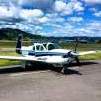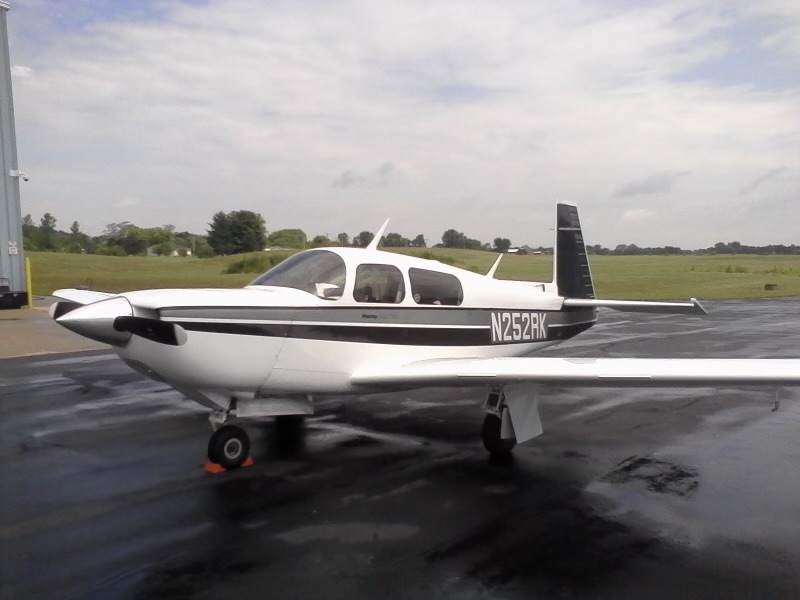-
Posts
5,748 -
Joined
-
Last visited
-
Days Won
28
Content Type
Profiles
Forums
Blogs
Gallery
Downloads
Media Demo
Events
Everything posted by Ragsf15e
-

TSIO360 Turbo check valve leaking.
Ragsf15e replied to squeaky.stow's topic in Modern Mooney Discussion
The yellow clamps are the correct ones. -

TSIO360 Turbo check valve leaking.
Ragsf15e replied to squeaky.stow's topic in Modern Mooney Discussion
Was it chafed through or leaking internally? I recently noticed mine had the wrong clamps holding both check valves. There are special fuel/oil resistant clamps specified for the check valves by tcm. Supposedly, the normal black ones deteriorate and then chafe through the valve like that. -
There’s an inspection panel on the front of the wing, just outboard of the wing root. That’s no farther than the other options and it’s out of the sun. I had the jpi one there on my F and it worked well. Mine was on the pilots side which is away from the exhaust. Right near the pitot drain.
-

Mechanic Recommendations - Seattle, WA area
Ragsf15e replied to Ayrton's topic in General Mooney Talk
If this is your first airplane purchase, i’d strongly recommend using the savvy pre-buy purchase. They will also help you find a shop and steer the pre-buy inspection through the big ticket items first which can keep your costs down. -
I think his max is 2500 based on stock ovation setup.
-
I actually just bought both sides (male/female) ends of that link, the center nut, and the bolts/nuts that secure it. All of it was available from lasar and/or Mooney. My nosegear is ok right now, but getting loose in that joint, so my mechanic wanted the parts on hand next time we have it on jacks. I’ll carefully consult the manual now to make sure it’s in right!
-
I’m planning on flying my 252 this week. I will post a picture of the g3x at 65% lop and 65% rop by the book and we can all see what the difference in TAS and/or temps are. From my experience, the TAS will be the same and the CHTs will be lower for LOP. TIT will be higher.
- 117 replies
-
- 4
-

-
- cost
- m20m bravo
-
(and 2 more)
Tagged with:
-
Oh yeah, as I said, I'm sure it happens. Mags fail as well. Either way, the other ignition source is there to get us home. I just don't think it's an issue.
-
Does anyone really believe running the other tank dry has anything to do with this? There are a few instances I’ve used the technique as well and certainly there are considerations, but I think we’re going off on a tangent here.
-
Holy S$!T!! Nice landing! That was not a forgiving road with the snow and posts on the sides! Well done. Also really glad it was on a road because anywhere else at -20c is an immediate survival situation and you better have good gear accessible! If it was -20c on the ground, what was the temp at cruise (re alcohol in fuel)? if the fuel line was pouring enough fuel out to kill the engine, wouldn’t the entire belly of the plane be blue ?
-
Dang! Something stuck in the quick drain?
-
This along with some minor rtv repairs could be a good solution. Most mechanics are ok with some minor repairs as turbo described above. Just don’t get into the duct tape and bailing wire as it is a critical part.
-
Approaching this first annual on my new 252, I was trying to figure out why I had so much blowby on my belly (tip to tail). I traced the tubing from the air oil separator and realized that the return tube was routed to the belly as well as the breather! The other end where the return should have been connected on the dipstick tube was left completely open which was added pressure in the case (it’s on top in the higher pressure area above the cylinders). I showed it to my mechanic the first time he saw the airplane and thought he would have some choice words for the folks who had installed the engine and did the two annuals after that (or the owner who didn’t care about his oil soaked belly), but he said, “sometimes s$!t happens. Everyone has a bad day.” My belly is so much cleaner now though…. Now back to the mysteries of electricity.
-
@MikeOH, my answer would have been exactly @Marc_B’s above. Although I had one on my F, so didn’t even have the pressurized thing. I like the 2000hr tbo (no more mag maintenace on that side) and never having the timing drift through the year. I think recovery on one mag would be fine if either one failed. As far as worrying about powering it? I don’t. Obviously the real mag is a backup, but how many times have you had complete electrical failure? I don’t mean a dead alternator, but battery completely dead too? I mean, sure, it can happen, but SF runs on very little power. I bet the chances of having one traditional mag fail (out of 2) are more than having the SF fail and/or complete electrical failure.
-
I had the “A” version on my F and it was flawless for ~500 hours that i put on it. I’ll put one on my 252 when the mags are due for inspection. My #2 alternator whines just a little now, there’s always something. Curious, what harness are you using? Did you get a new Maggie one for the SF? My local shop tried to put one on their SR20 and couldn’t get it to work at all with their old harness even though it tested fine and worked perfectly with the mag. Eventually they got a new harness and it worked.
-
I think you mean ktas. Yes my true airspeed is much higher too, maybe ~8 knots higher than you indicate above. But my kias (indicated) is right around 141kias.
-
I think you’re probably right. I am just trying to put all the information together before approaching my IA about disassembling and cleaning the check valves. I’d much rather start with cleaning and checking them before I throw ~$1400 to buy a new one!
-
interesting. I might have to look into that eventually. I have about 25 hours in my new plane and it's had g3x/gfc500 for 2.5 years. I had my first disconnect yesterday. Looking at the logs, got the "Fail / System not useable" code. Only thing I noticed was the YD was at like 33 torque for a while before the disconnect. During the disconnect, the YD stayed engaged. I manually disengaged, then re-engaged and the YD went down to like ~7 and everything worked fine for the rest of the flight. Logs show good gps and attitude. As this happened, I was on departure, full power, 120kias climb. I probably had a weak right foot... could that be making the YD work harder and cause a disconnect? And if so, why would the YD remain engaged? @PT20J do you still get a random disconnect from time to time?
-
Thanks. I see they have those nice instructions for the check valves on the -550s, but I don't think ours are the same (different part numbers) and I think a different type unfortunately. I think those check valve instructions don't apply to ours.
-

TSIO360 Turbo check valve leaking.
Ragsf15e replied to squeaky.stow's topic in Modern Mooney Discussion
Did you have an instructions/SB/ etc showing how to disassemble, clean, replace O rings, and reassemble the check valves? I'd like to clean out my return check valve before spending the $1400 on a new one, but I'm not sure my mechanic will want to disassemble it? Also, @kortopates was correct about the yellow clamps being specified by TCM. Here's the documentation. I just noticed that mine are the wrong ones (they are the normal black clamps). backorderd new ones from spruce. better check valve clamps M87-14R1.pdf -
After you guys cleaned up the check valves did you continue getting the leak out the exhaust? Mine is starting to do something similar, but the turbo was OH only 200 hours ago, so I'm pretty sure it's not the turbo. Something else is letting oil in there while it's parked...
-
The gami spread is as important as your good ignition. What is your spread? If you haven’t checked that, likely that’s where you should start. Cylinders need to peak pretty close together (at about the same ff). Mine runs well at 65% lop. I’ve been using 30”, 2300, 10.4 and seeing about 141kias at all altitudes.
-

Mooney MK 20- 231 Rocket Available
Ragsf15e replied to Vincent H. Smith's topic in Aircraft Classifieds
Are the dates correct, 108 hours in the last 12 years total?? -
You’re right that it’s probably lean of peak on all cylinders, but you don’t know unless you’ve checked each cylinder as it peaks. If your fuel distribution isn’t good, you could have some ROP and some LOP. It won’t hurt anything at a low enough power, but it’s not a good place to run at higher power settings.



